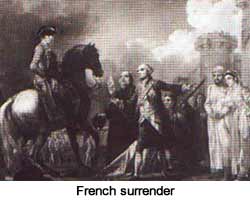

 |  |
 The actual onset of the struggles arose from Anglo-French commercial and political rivalry in India and political rivalry in Europe. In the late seventeenth and early eighteenth century the French stake in India was not great enough to be worth the despatch of an English armament. The two companies therefore declared neutrality and went on trading. But between 1720 and 1740 the French Company's trade increased ten times in value until it was nearly half that of the old-established English company at about Pound 880,000.
The actual onset of the struggles arose from Anglo-French commercial and political rivalry in India and political rivalry in Europe. In the late seventeenth and early eighteenth century the French stake in India was not great enough to be worth the despatch of an English armament. The two companies therefore declared neutrality and went on trading. But between 1720 and 1740 the French Company's trade increased ten times in value until it was nearly half that of the old-established English company at about Pound 880,000. The stake of both countries in India was now considerable. The British were deeply involved with indigo, saltpetre, cottons, silk, and spices; they had a growing, trade with China and a strong vested interest in England itself in the form of shipping and stores brokers. The value of the trade was more than ten per cent of the public revenue of Great Britain at that time. The occasion for intervention arose with Frederick the Great of Prussia's seizure of Silesia in 1740. In the war of the Austrian Succession which followed (1740-48) Britain and France were on the opposite sides in the rival coalitions. It is these wars, of wholly European origin, which provided the political turning-point in the history of modern India. In 1746 a French fleet made possible the capture of Madras. In 1748 a British fleet made an unsuccessful attempt to capture Pondicherry. Madras was again exchanged between the French and the British by the treaty of Aix-la-Chapelle. next page >> |
Copyright ©2000 indiansaga.info. All rights reserved.
By using this service, you accept that you won't copy or use the data given in this website for any commercial purpose.
The material on indiansaga.info is for informational & educational purpose only.
This site is best viewed at 800 X 600 picture resolution.